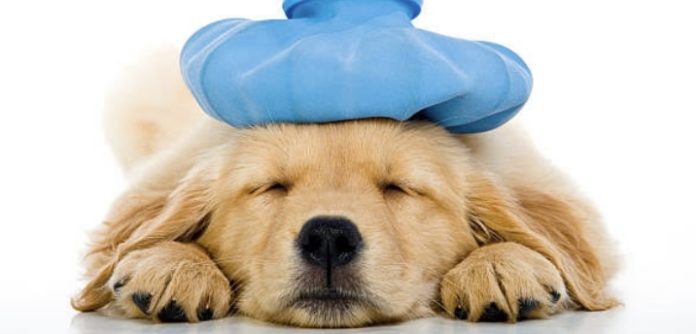If your dog is suffering from a severely debilitating disease and is too sick to groom and feed itself, the nursing and loving care it receives from you will have a vital effect upon recovery. This nursing care extends to grooming, hygiene as well as proper feeding.
- Keep sick dogs in a warm, quiet, dim-lit place. Try not to disturb them.
- Keep sick dogs clean. Special care should be taken if they are suffering from diarrhoea and vomiting for psychological and sanitary reasons. All animals become distressed if allowed to foul themselves; if they have fouled themselves, they should be gently washed with soap and water. A little talcum powder dusted on after washing is helpful.
- Larger dogs should be turned regularly, every four hours, to avoid bedsores.
- Apart from doing what is necessary for its well-being, you should leave a sick dog alone as much as possible. There is a difference between loving care and fussing. So do not fuss over a sick dog.
- All bowls, dishes, spoons, etc., that come in contact with the dog must be sterilized in boiling water after each meal.
Scrupulous hygiene is essential to successful nursing.
First Aid Kit
All dog owners should prepare a first aid kit and keep it in a tin, clearly marked and in a safe place.
It should contain the following:
- A pair of sharp-edged, blunt-pointed scissors.
- A pair of forceps (tweezers)
- A roll of 2 Elastoplast
- Four rolls of 2 roller bondage
- A packet of cotton wool
- A packet of lint
- A bottle of hydrogen peroxide
- A bottle of antiseptic, e.g. Savlon, Dettol, Roccal
- A razor blade
- A packet of needles
- Codeine tablets
- Paracetamol tablets
- A packet of cotton buds
- Milk of magnesia Table salt
- An eyedropper
In the case of Dogs bite humans
Sometimes your dog or that of your neighbour may bite you.
Treatment:
- Wash the bite with soap and cool boiled water.
- Rinse the soap off
- Cover the bite with a clean bandage.
- Visit your doctor or the casualty department of the local hospital. Remember, all animal bites are contaminated and, if it is a deep bite, an anti-tetanus injection can not be avoided.
Allergies
An allergy is a reaction by the body to a substance to which it is oversensitive. These substances include animal hair, plant pollen, certain drugs, certain foods, detergents and, not infrequently, the saliva of fleas. The physical reaction may take the form of vomiting, diarrhoea, dribbling, running eyes, redness of the skin, itching, lumps on the skin and swelling of the lips and eyelids. It is, of course, to remove the cause.
Treatment:
The best way of treating an allergy is, of course, to remove the cause. Suppose this is not possible, either because the allergic substance cannot be identified or because it is in the air, such as pollen. In that case, it is necessary to treat the allergic dog with the appropriate drug.
Most allergies respond well to antihistamines and corticosteroids. But the treatment must be given by a veterinary doctor.
Use of Antibiotics
The drugs used for dogs and pets include Penicillin, Aureomycin, Streptomycin, Terramycin etc. The important thing to remember about antibiotics is that you must keep up the level by regular doses until the infection is over once you begin. Otherwise, the bacteria become resistant to the particular antibiotic. Remember that there is still no antibiotic effective against viruses. However, we can use antibiotics in the virus disease of dogs to stop their body from coming to other bacteria while it is fighting the virus.
An antibiotic is a drug that kills the germs that cause certain infections. They are most effective and administered during the early stage of the infection. If your dog develops an infectious disease, the particular strain of bacteria responsible should be identified. Unfortunately, disease states are rarely ideal, so a broad-spectrum antibiotic is administered.
Ampicillin is one of the most effective antibiotics against a wide range of infections.




